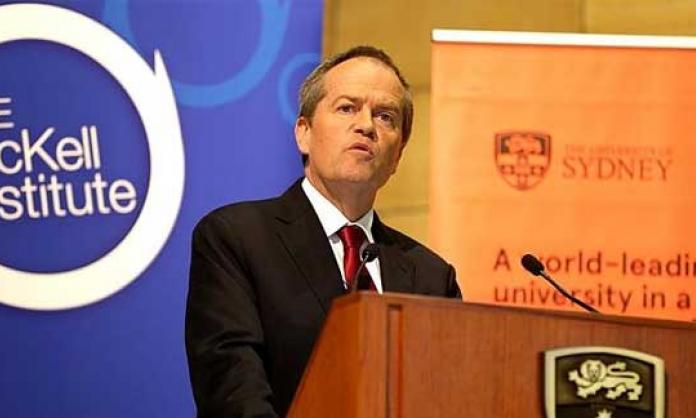When it comes to the speeches of politicians, reading between the lines is an essential skill. If you listened to Bill Shorten’s pre-budget address on 4 May, hosted by the McKell Institute at the University of Sydney, you’d have heard a lot about a “smart, modern and fair” Australia that the Labor Party would build if only it were in office.
“Get smarter or get poorer”, said the leader of the opposition, arguing that training up a more highly skilled workforce is crucial for Australia to “compete and succeed in the new world”. This means ambitious strategies to increase to 40 percent the proportion of people holding a bachelor degree or higher by 2025.
You’d be forgiven for thinking that Labor must have a policy to increase university funding massively. But, when asked about this, Shorten offered only vague statements about “high-quality education” and closing “the gap between enrolments and degrees”. This would require a drastic expansion of student welfare and housing, something that has not been in Labor’s vocabulary for decades.
Most telling was the opposition leader lambasting Tony Abbott for turning from “extreme ideology” to “shallow populism” – alluding to the fact that Abbott’s unpopularity means he has little room for anything ambitious in this year’s budget. “The Australian people are up for tough decisions, but not unfair ones”, Shorten said. “We can’t afford a dull budget.”
In other words, there need to be cuts but the Liberals have stuffed it up. A “dull” budget would be a relief for workers after last year’s abomination, but intolerable for the Business Council, which wants new rounds of attacks.
The “new world” means increased insecurity, higher levels of exploitation and less wealth to the working class. The Australian Labor Party is positioning itself as the best choice for the rich and powerful of Australia to make, and sell, any new attacks.
This was proven in spades in the Q&A section. Socialist Alternative members asked Shorten about the March deal done in South Australia between the SDA, the retail workers’ union, and Business SA to abolish Saturday penalty rates and halve Sunday rates – a devastating sell-out that the opposition leader praised at the time as “industrial laws working”.
The question was simple: how is this compatible with the “fair” Australia that the ALP is reportedly fighting for? Shorten’s extensive response did not once include the phrase “penalty rates”. He did express support for a “strong safety net” and a high-wage economy. But he said that, come election time, criticism of the ALP “won’t be coming from the far left, but from the right”.
In other words, keep your criticisms to yourself or you’ll be lining up with the Liberals. If anyone’s lining up with the Liberals, it’s an opposition leader who won’t argue in defence of penalty rates.
Our members had another go, this time about the Labor Party’s abominable record on asylum seekers. Where do refugees languishing in concentration camps fit into the bright future that the ALP has in store for us?
For several minutes, Shorten responded with talk of population policy: Australia’s birth rate, skilled migrant labour, 27 million people by 2025. When repeatedly heckled him for avoiding the question, he finally made the typical excuse about preventing drownings, and whether we wanted to see more of what’s been happening in the Mediterranean over the past few weeks.
He didn’t mention that there have been more drownings off the Italian coast this year than ever before precisely because, at the end of 2014, the EU changed its search-and-rescue operations into an Australian-style security and border protection operation.
It is notable that Shorten received no applause from an otherwise supportive audience for these remarks.
Shorten’s address demonstrates that a comparatively “dull” budget won’t signal the end of attacks on living standards. The Labor Party is positioning itself as the team capable of selling the cuts. To push back the Business Council, the business heavyweights behind government policy, we need to continue to fight back from the bottom up.








